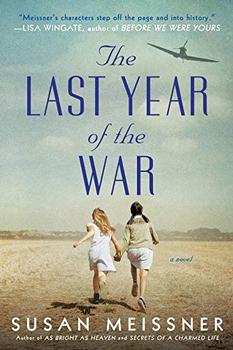Summary | Excerpt | Reading Guide | Reviews | Beyond the Book | Readalikes | Genres & Themes | Author Bio

My breath stilled in my lungs.
The article included a photograph of Mrs. Hayashi standing on a grassy bank with the Golden Gate Bridge in the background. Her hair, a wiry gray, was short and stylish, and her face was wrinkled in all the same places mine was. Her beautiful Asian features nevertheless suggested she had seen much in her seventy-six years. A Japanese woman in her mid-fifties stood next to her. Mrs. Hayashi's daughter, Rina Hammond.
Below this picture, in an inset, was a black-and-white photo of Mariko Inoue Hayashi and her parents and older brother and sister at the Crystal City Internment Camp, in the late fall of 1944, as they stood in front of their quarters on Meridian Road. There was a blond-haired teen, out of focus and only half-pictured, in the background, leaning on a fence. The blond girl's head was cocked as though she'd been impatient for the photographer to finish.
I had reached with a shaking hand to touch the blurred image of that teenage girl whose physical features were perfectly Teutonic in every way—fair-haired, with large, light-filled eyes. Angular jaw. Full lips. Pronounced dimples.
I can still remember standing there on the sideline as that picture of Mariko and her family was taken. That same photographer had taken my family's photo days earlier. She and I hadn't known the photo was needed for initiating plans to have us all repatriated; Mariko and her family to Japan, me and mine to Germany. Papa and Mommi didn't break the news to Max and me until later.
My hand traveled to Mariko's black-and-white face. On the last day we were together, we'd promised that we'd meet up with each other in the States—when the war was over and when we had all picked up our lives again from where we had been plucked out of them. We'd pledged to each other that we'd find a way, and we had renewed that vow after the war ended and we were yet still thousands of miles apart.
As I sat there on the sofa with my fingertips on the smooth surface of the iPad, that old promise between Mariko and me seemed to thrust itself out of my heart to rattle the brittle bones of my rib cage. I shuddered as if I'd been shaken awake from a long dream.
Mariko was in San Francisco. She was alive; I was sure of it. I had not found her now only to discover she had died since this article was written. She was still alive. My soul refused to believe anything different.
I moved my hand away from the screen and read the article again. Mariko's daughter, Rina, was the guest relations manager of the Ritz-Carlton, a five-star hotel in downtown San Francisco. If I could speak face-to-face with Rina, I knew I could at last speak face-to-face with Mariko again; it was as simple as that. Surely it would be as simple as that. There was something I wanted to thank her for before Agnes overtook me for good. I should have thanked Mariko long ago.
Waves of regret that I hadn't looked for her before now were already washing over me, but I couldn't pay them mind. I couldn't. Nor could I ponder this new thought that she hadn't looked for me, either, all these years. I had no time for those kinds of musings.
I called a travel agent. Not my travel agent, a travel agent. I knew when Pamela and Teddy saw the note that I planned to leave for them—that I needed to take a quick trip and would be back soon—they would contact Ginnie at the travel agency that the Dove family has used for the past seventy years, before I even was a Dove. Pamela would ask her what arrangements she had made for me, and Ginnie would say she hadn't made any.
I asked this new agent, whose name and agency I can't recall at this precise moment, to arrange for me a first-class seat on the first available flight to San Francisco and a room at the downtown Ritz-Carlton for a week, but only after making sure that a certain Mrs. Rina Hammond was still the guest relations manager. I had my arrangements in less than an hour. It's easy to do such things when you're the widow of a wealthy man. Not pleasurable, mind you, but easy.
Excerpted from The Last Year of the War by Susan Meissner. Copyright © 2019 by Susan Meissner. Excerpted by permission of Berkley Books. All rights reserved. No part of this excerpt may be reproduced or reprinted without permission in writing from the publisher.
Your guide toexceptional books
BookBrowse seeks out and recommends the best in contemporary fiction and nonfiction—books that not only engage and entertain but also deepen our understanding of ourselves and the world around us.